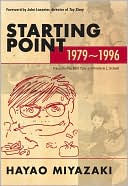31 Aug / Starting Point: 1979-1996 by Hayao Miyazaki, translated by Beth Cary and Frederik L. Schodt, foreword by John Lasseter

 With the adorably acclaimed Ponyo now out in theaters nationwide with its dubbed all-star Hollywood cast (Miley Cyrus’ little sister? one of the Jonas Brothers?), a whole new young audience is enjoying the latest from anime maestro Hayao Miyazaki, creator of the spectacularly successful My Neighbor Totoro and the 2003 Best Animated Feature Film Oscar-winner Spirited Away. In this fabulous collection of translated musings, articles, interviews, even reproductions of sketches and scrapbook entries, Miyazaki devotees have almost 500 pages to get to know the master a little better.
With the adorably acclaimed Ponyo now out in theaters nationwide with its dubbed all-star Hollywood cast (Miley Cyrus’ little sister? one of the Jonas Brothers?), a whole new young audience is enjoying the latest from anime maestro Hayao Miyazaki, creator of the spectacularly successful My Neighbor Totoro and the 2003 Best Animated Feature Film Oscar-winner Spirited Away. In this fabulous collection of translated musings, articles, interviews, even reproductions of sketches and scrapbook entries, Miyazaki devotees have almost 500 pages to get to know the master a little better.
The collection opens with John Lasseter’s confession that his Pixar films, A Bug’s Life and Toy Story 2, would not nearly have been as successful artistically had he not studied Miyazaki’s works. He uses clips from Miyazaki films as teaching tools, and even has his creative team study key Miyazaki scenes. I’m pretty sure that his Oscar-winning scriptwriter for Toy Story 3 was long familiar with Miyazaki’s films … the Arndt twins practically grew up with my Miyazaki-groupie-way-cool-before-his-time middle brother hanging out on the skate ramp they constructed in my parents’ backyard and eating kimchi in between. So we’ll definitely be looking for Miyazaki’s influences in the next Woody/Buzz/Jessie adventure come November.
So why the dates? December 1979 was when Miyazaki made his directorial debut with his first feature film, Lupin III: The Castle of Cagliostro. July 1996 was when the original Japanese version of this book was published as Shuppatsuten 1979-1996.Another of his signature films, Princess Mononoke, would be released the following year. In between, Miyazaki talks all about the various works that made him world famous … but he also talks rather intimately about his non-artist life, too: about how he feels about the legendary Osamu Tezuka (that’s Mr. Tezuka, not God Tezuka), about how he let his wife raise their two sons as his total workaholic schedule wasn’t conducive to being an available parent, about why he likes plants whose appreciation he discovered after he turned 30. The voice that emerges is quirky, intelligent, opinionated, probing, entertaining, impatient, and addictive. Everything you might expect from a genius and then some.
Readers: Adult
Published: 2009 (United States)
